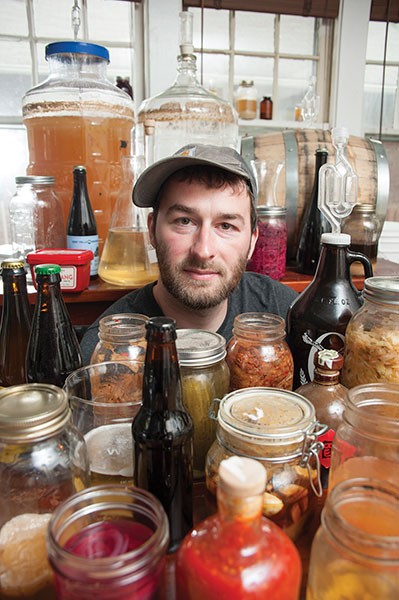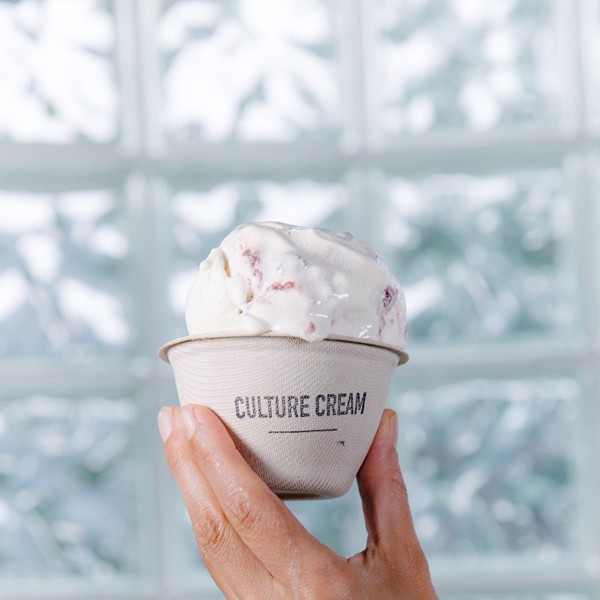Derek Dellinger is fascinated with fermentation. Nearly every day with the passion of an alchemist he combines yeast strains, souring bacteria, hops, and other ingredients that then engage in an intricate microscopic dance that results, after the fermentation process is complete, in beer.
As the head brewer at Kent Falls Brewery, a small but increasingly popular brewery located on a farm in Kent, Connecticut, Dellinger produces some sought-after beer. But beer is only the most visible fruit of his fermentation fascination.
A 31-year-old writer and former homebrewer who splits his time between Beacon and Kent, Dellinger says that when he started as a homebrewer, it led him down the rabbit hole of the fermentation world. "Beer involves all these different fermentation agents, all these different microbes and the craft beer community at large—and especially the mindset of a home brewer—kind of invites this sense of creativity and experimentation that led to me breaking out into all types of fermentation," he says. After beer he made cider, kimchi, sauerkraut, and even beet kvass, a pickled fermented beet beverage. ("Beet kvass tastes pretty much like what it is: a sour, salty, earthy beet-flavored tonic," says Dellinger. "Personally, I like beets, and I love the taste of beet kvass. It's not necessarily something I'd drink a pint of with dinner, but it's really enjoyable to sip with lunch or breakfast. It's very flavorful, so you only need a few ounces to get your fix, and it's extremely healthy as well.")
In 2014, he embarked on a yearlong experiment with himself as the guinea pig—vowing to consume nothing but fermented foods and beverages from January 1 of that year until January 1, 2015.
A Fermented Odyssey
He chronicles this culinary odyssey, where too much kimchi was his Scylla and intense guacamole cravings his Charybdis, in The Fermented Man, due out in July from Overlook Press. In this tell-all food memoir, Dellinger recounts the highs and lows of the experiment, delves into the science and history of fermentation, and examines its culinary value and nutritional impact. With an engaging writing style and keen sense of humor, he jumps into Michael Pollan food territory with a Hemingwayesque sense of personal adventure, at one point traveling to Iceland for hakarl, fermented rotten shark meat, a quest that left a bad taste in his mouth, literally.
The book began as a sort of thought experiment for Dellinger. "Doing all this homebrewing, doing this research, I suddenly realized that there's this whole land of fermented foods out there that make up this giant contingent of what we eat on a daily basis. The thought just slipped into my head that this is such an expansive, all-encompassing world of food that you can probably live off of fermented food," he says.
When he ran it by publishers at the Overlook Press, they loved the concept, and the thought experiment became an actual experiment—or, as Dellinger puts it: "It sort of accidentally just turned into a real book idea and all of a sudden I agreed to do this."
Advance reviews of the book have been positive. The work has earned praise from the Weston A. Price Foundation, and Kirkus Reviews, wrote "Dellinger ably explains the wide range of fermented foods, the role flavor plays, health benefits, and the basic processes, and he includes a few recipes....The author hopes his intriguing experiments will open eyes and palates to the culinary and health benefits of fermented foods."
While there's a tendency for people to look at this yearlong undertaking as an exercise in Spartan-like discipline, or a Morgan Spurlockesque take on stunt eating, one of Dellinger's goals in writing the book was to show how widespread fermentation is and therefore how well one can actually eat on a fermented diet: "It was something that I realized wouldn't be that difficult and [the yearlong experiment] would be a hopefully cool and interesting way of demonstrating to people how universal fermentation is." "This is a hook to make you realize that fermentation is everywhere in most of the things we already eat on a daily basis," Dellinger says. "There's a lot of things that people don't realize are fermented, like yogurt or cheese. Cured meats are the big one that kind of blows people's minds, that you can ferment meat to begin with, and that a lot of the meat we eat on a regular basis, like salami and prosciutto, is fermented."
Unexpected Health Effects
Though he praises the health benefits of fermented foods, he has not remained fermented-only and stresses he is not recommending that course for others. "This is not a diet that I've created to go on 'Dr. Phil' and encourage other people to follow. It's a diet that I only followed for a year, just to educate people within the framework of this book. It was a bit arbitrary as a diet. It was more of a culinary and educational experiment than a health experiment."
However, there were likely healthy side effects. Fermentation is human society's original method for preserving food, and many experts praise fermented foods for the healthy microbes they contain that can help increase the health of our guts.
In addition to consuming these healthy microbes, Dellinger also found himself, by necessity, avoiding processed foods and eating more simply. "In a general ongoing sense, it's good to eat simply and to keep your meals true to their basic elements," he says. While sticking to fermented foods, "You find yourself eating more pure, natural foods. You're eating things as they are; you're not making these elaborate dishes all the time where you tend to overeat."
Back in the Land of the Supersized
Dellinger recounts in the book that when he came off the diet it took some time to adjust to society's supersized servings. "Compared to the elementary meals I'd been eating for the last year, the sheer size and variation of 'normal' meals, the meals that restaurants have trained us to think of as a standard serving size, seem truly gluttonous," he writes.
While on the diet, Dellinger says one of the hardest things to adjust to was its simplicity. "What I missed the most was probably elaboration, there's that psychological weird trip that it just didn't feel right that I wasn't eating elaborate meals all the time," he says.
In addition, there were specific foods that had no perfect fermented substitute. "I would miss things like burgers even though I could eat similar sandwiches that had meat, cheese, and bread and sauce; I could eat things that were similar but not quite a burger, and that not quite getting what you're craving begins to itch after a while."
Beyond all other foods, he craved the bright freshness of an avocado. "Avocados are really best fresh," he says. "It's very difficult to ferment an avocado. I did have one fermented avocado at this high-end cafe in New Orleans that used this elaborate Japanese pickling method to ferment avocados, and they were pretty incredible."
But even these expert-fermented avocados weren't quite the real thing and as the end of the experiment approached Dellinger's cravings for guacamole grew stronger. "The first thing I ate when the diet was done January 1, after midnight on New Year's Eve, was a bowl of guacamole. I shoved it down my face and got full pretty quickly," he recalls.
Today, Dellinger is not eating exclusively fermented foods but says his diet has changed since the experience. "I'm certainly eating more fermented foods now than I was before, and it's definitely opened a whole new culinary world to me, a world of food with health benefits that I wasn't aware of before," he says.
The end of the book is full of fermented recipes that Dellinger developed and continues to make and enjoy. These include aged dishes like Kimchi Sourdough, Honey Fermented Garlic, and Lacto-Fermented Salmon.
And Dellinger's experiments with fermentation are far from over. He continues to brew professionally at Kent Falls Brewery and is set to offer even more IPAs in addition to the brewery's farmhouse offerings, as well as more barrel-aged products.
He also plans on staying busy as a writer. He's not yet sure what his next nonfiction project will be, though it might be beer related; he also hopes to publish some works of fiction. As to how he finds time to manage the intense demands of both a writing and a brewing profession? "I have no life, and I don't go anywhere," he jokes, before adding, "I certainly could have picked two easier career paths to juggle, but they both feed off of each other and, fortunately, they're both complementary."


















